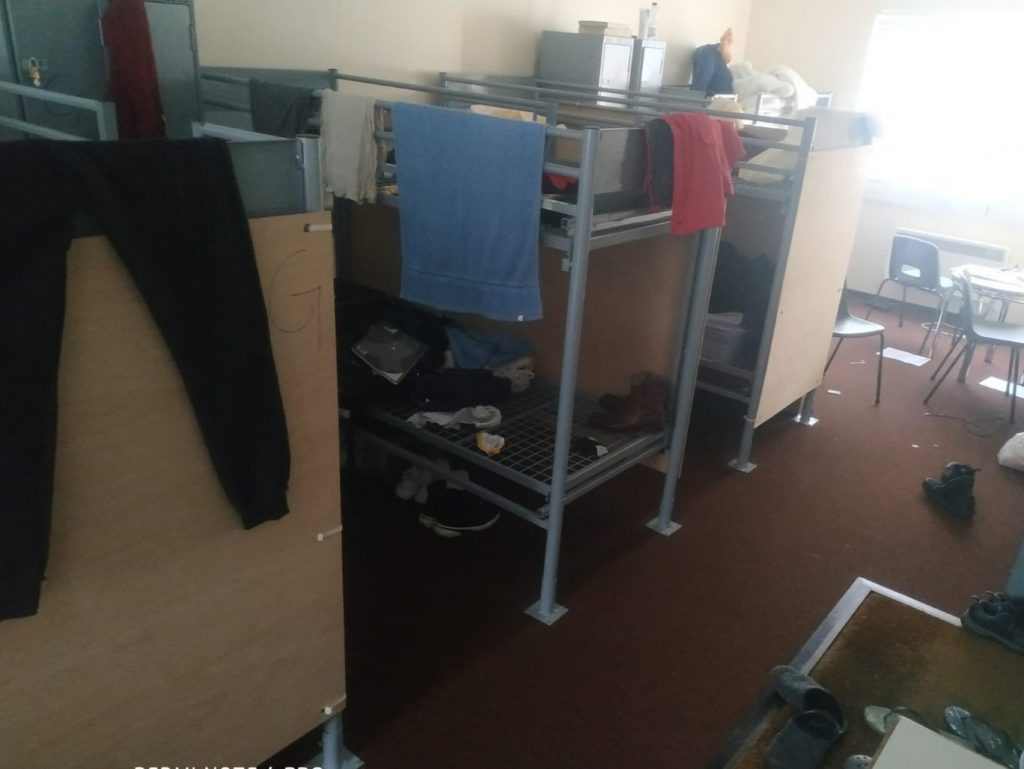A COURT CASE has been filed in the High Court against the Home Office by a resident of the Penally Asylum Seeker Accommodation Centre.
The 20-year-old Iraqi national at the centre of the case has mounted a legal challenge arguing the way that he has been treated is “plainly unlawful”.
His lawyers are arguing on his behalf that an ex-army camp holding hundreds of asylum seekers is in breach coronavirus guidelines, and places residents at risk of suffering degrading treatment.
The asylum seeker’s legal team have also said that the conditions in the camps are breach the government guidelines on Covid-19 precautions, as well as placing residents at risk of suffering from “degrading” treatment due to unhygienic conditions and a lack of access to medical care.
It was revealed in court on Friday that an asylum seeker recently tested positive for the coronavirus in Penally barracks – and there was no indication that others who were in close contact were allowed, or required, to self-isolate, nor that anyone who might have been in contact had been tested and treated as required.
The Home Office has already faced a number of individual challenges from asylum seekers – at least 10 of which the department conceded before the case went to court, resulting in the claimants being moved out.
Submissions were made in the High Court on Friday (Dec 4).

The Iraqi says he was one of the first to arrive at the camp, having been moved to Penally barracks soon after it opened. He was previously housed in various hotels since he arrived to the UK in March this year.
The legal team argues that his continued stay at the camp has posed a “real risk” to his health and that there had been “no lawful or reasonable justification for removing him from suitable accommodation to the facility”.
The court was told that conditions at the camp did not allow for social distancing nor for compliance with the six-person rule, and that there was “no indication” that residents had proper access to medical care or masks, unless provided by a charity.
In documents submitted to court, the legal case is put forward as follows: “The [Home Office’s] failures arguably amount to a breach of Article 3 [of the] European Convention of Human
Rights and amount to serious mistreatment, neglect and general poor care on the part of the secretary of state,”.
They went on to state that while it was accepted that there was an “added burden” on the Home Office because of Covid-19, the department’s actions were nonetheless “plainly unlawful”.
A Home Office spokesperson said residents were staying in safe, Covid-compliant conditions, in line with the law and social-distancing requirements, and were provided with guidance in relation to self-isolation, social distancing and hygiene.
However, a lawyer acting for the 20-year old Iraqi said that while the Home Office assert that the barracks is Covid safe, it is “plainly not given the absence of even the most basic Covid precautions such as hand sanitiser.”
Shadow home secretary Nick Thomas-Symonds has condemned the decision to place asylum seekers in the ex-military facilities, calling for “proper processes for transparency and accountability” in place throughout the immigration system.
Sonia Lenegan, legal director at the Immigration Law Practitioners’ Association, said: “Since the barracks were repurposed as asylum accommodation in September, concerns have been raised about the unsuitability of this accommodation by NGOs, lawyers, medical professionals, the Welsh government, the police as well as the local community.
“It is time for the Home Office to listen to these concerns, close the barracks and move people into safe and appropriate accommodation.”
A Home Office spokesperson told The Pembrokeshire Herald: “As this is an ongoing legal case it would be inappropriate to comment further.”
The case continues.
















